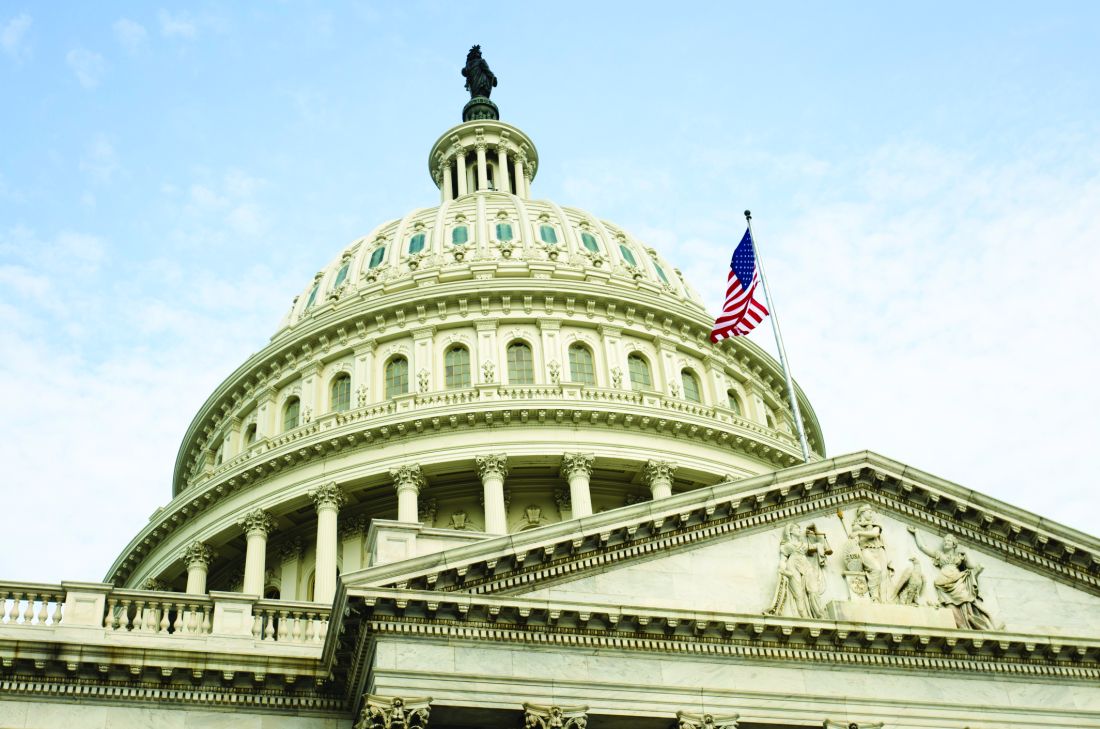User login
Both houses of Congress have now approved a bill to provide terminally ill patients with access to experimental treatments, despite opposition from many Democrats and more than 100 patient and physician groups. President Trump is expected to sign the legislation.
By a vote of 250-169, the House passed S. 204, the Trickett Wendler, Frank Mongiello, Jordan McLinn, and Matthew Bellina Right to Try Act of 2017 on May 22. All Republication House members voted for the bill, as did 22 Democrats. The Senate had passed the bill by unanimous consent in August 2017.
“This is dangerous legislation that threatens FDA’s [Food and Drug Administration’s] authority over insuring that medical treatments are effective,” Rep. Frank Pallone (D-N.J.), ranking member of the House Energy and Commerce Committee, said during the debate on the bill. “This bill needlessly exposes vulnerable patients to the risk of unproven medications.”
He noted the language will apply broadly to anyone who has been diagnosed with a disease but may not be terminal.
“The term ‘life-threatening disease or condition’ could include chronic and often manageable diseases, such as diabetes or chronic heart failure,” he said. “If all patients with diabetes and other chronic but manageable illnesses were eligible, you have greatly expanded the scope of the legislation well beyond the scope of most state laws and FDA’s expanded access program. This exposes an even greater number of patients to risk and undermines our clinical trial program by diverting patients from trials that could support full approval to the alternate pathway.”
The law notes that the experimental drug must have cleared phase 1 testing and experimentation, and development and testing must be ongoing. Treating physicians will not be compensated for certifying a patient as eligible to gain access to an investigational drug.
Patient and physician groups, including the American Society of Clinical Oncology, Friends of Cancer Research, American Lung Association, Cystic Fibrosis Foundation, and National Organization for Rare Disorders, voiced their opposition in a May 21 letter to House Republican and Democratic leaders.
“The Senate version of the legislation is less safe than the pathway proposed in the House version and is dangerous compared to the current [FDA] expanded access program,” according to the groups. “Both House and Senate versions would also remove FDA’s consultation on dosing, route of administration, dosing schedule, and other important safety measures available under FDA’s current expanded access program.”
The organizations noted that, while they did not support the House version, it “includes improved patient safeguards compared to the Senate version. The Senate version would negatively impact patient safety substantially, and our collective organizations are strongly opposed.”
President Trump has signaled he will sign the bill.
Both houses of Congress have now approved a bill to provide terminally ill patients with access to experimental treatments, despite opposition from many Democrats and more than 100 patient and physician groups. President Trump is expected to sign the legislation.
By a vote of 250-169, the House passed S. 204, the Trickett Wendler, Frank Mongiello, Jordan McLinn, and Matthew Bellina Right to Try Act of 2017 on May 22. All Republication House members voted for the bill, as did 22 Democrats. The Senate had passed the bill by unanimous consent in August 2017.
“This is dangerous legislation that threatens FDA’s [Food and Drug Administration’s] authority over insuring that medical treatments are effective,” Rep. Frank Pallone (D-N.J.), ranking member of the House Energy and Commerce Committee, said during the debate on the bill. “This bill needlessly exposes vulnerable patients to the risk of unproven medications.”
He noted the language will apply broadly to anyone who has been diagnosed with a disease but may not be terminal.
“The term ‘life-threatening disease or condition’ could include chronic and often manageable diseases, such as diabetes or chronic heart failure,” he said. “If all patients with diabetes and other chronic but manageable illnesses were eligible, you have greatly expanded the scope of the legislation well beyond the scope of most state laws and FDA’s expanded access program. This exposes an even greater number of patients to risk and undermines our clinical trial program by diverting patients from trials that could support full approval to the alternate pathway.”
The law notes that the experimental drug must have cleared phase 1 testing and experimentation, and development and testing must be ongoing. Treating physicians will not be compensated for certifying a patient as eligible to gain access to an investigational drug.
Patient and physician groups, including the American Society of Clinical Oncology, Friends of Cancer Research, American Lung Association, Cystic Fibrosis Foundation, and National Organization for Rare Disorders, voiced their opposition in a May 21 letter to House Republican and Democratic leaders.
“The Senate version of the legislation is less safe than the pathway proposed in the House version and is dangerous compared to the current [FDA] expanded access program,” according to the groups. “Both House and Senate versions would also remove FDA’s consultation on dosing, route of administration, dosing schedule, and other important safety measures available under FDA’s current expanded access program.”
The organizations noted that, while they did not support the House version, it “includes improved patient safeguards compared to the Senate version. The Senate version would negatively impact patient safety substantially, and our collective organizations are strongly opposed.”
President Trump has signaled he will sign the bill.
Both houses of Congress have now approved a bill to provide terminally ill patients with access to experimental treatments, despite opposition from many Democrats and more than 100 patient and physician groups. President Trump is expected to sign the legislation.
By a vote of 250-169, the House passed S. 204, the Trickett Wendler, Frank Mongiello, Jordan McLinn, and Matthew Bellina Right to Try Act of 2017 on May 22. All Republication House members voted for the bill, as did 22 Democrats. The Senate had passed the bill by unanimous consent in August 2017.
“This is dangerous legislation that threatens FDA’s [Food and Drug Administration’s] authority over insuring that medical treatments are effective,” Rep. Frank Pallone (D-N.J.), ranking member of the House Energy and Commerce Committee, said during the debate on the bill. “This bill needlessly exposes vulnerable patients to the risk of unproven medications.”
He noted the language will apply broadly to anyone who has been diagnosed with a disease but may not be terminal.
“The term ‘life-threatening disease or condition’ could include chronic and often manageable diseases, such as diabetes or chronic heart failure,” he said. “If all patients with diabetes and other chronic but manageable illnesses were eligible, you have greatly expanded the scope of the legislation well beyond the scope of most state laws and FDA’s expanded access program. This exposes an even greater number of patients to risk and undermines our clinical trial program by diverting patients from trials that could support full approval to the alternate pathway.”
The law notes that the experimental drug must have cleared phase 1 testing and experimentation, and development and testing must be ongoing. Treating physicians will not be compensated for certifying a patient as eligible to gain access to an investigational drug.
Patient and physician groups, including the American Society of Clinical Oncology, Friends of Cancer Research, American Lung Association, Cystic Fibrosis Foundation, and National Organization for Rare Disorders, voiced their opposition in a May 21 letter to House Republican and Democratic leaders.
“The Senate version of the legislation is less safe than the pathway proposed in the House version and is dangerous compared to the current [FDA] expanded access program,” according to the groups. “Both House and Senate versions would also remove FDA’s consultation on dosing, route of administration, dosing schedule, and other important safety measures available under FDA’s current expanded access program.”
The organizations noted that, while they did not support the House version, it “includes improved patient safeguards compared to the Senate version. The Senate version would negatively impact patient safety substantially, and our collective organizations are strongly opposed.”
President Trump has signaled he will sign the bill.

